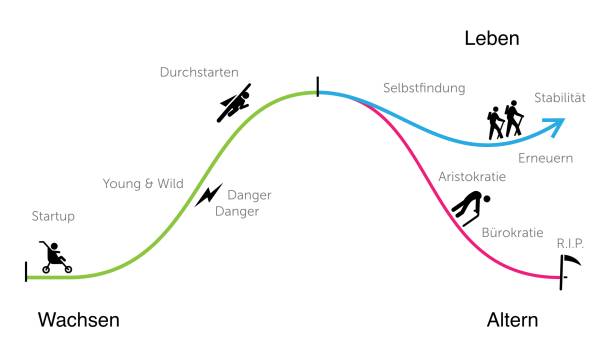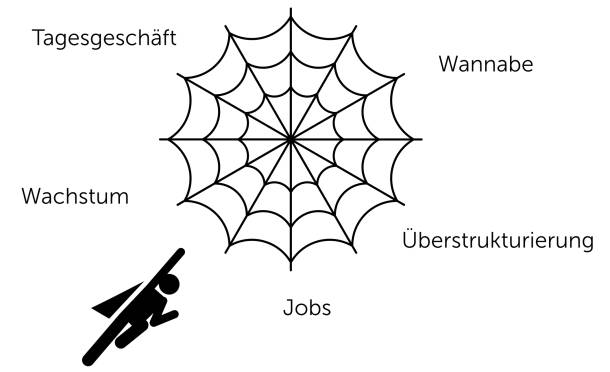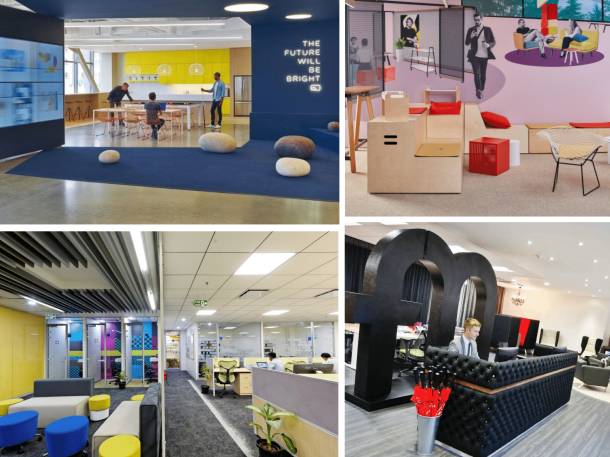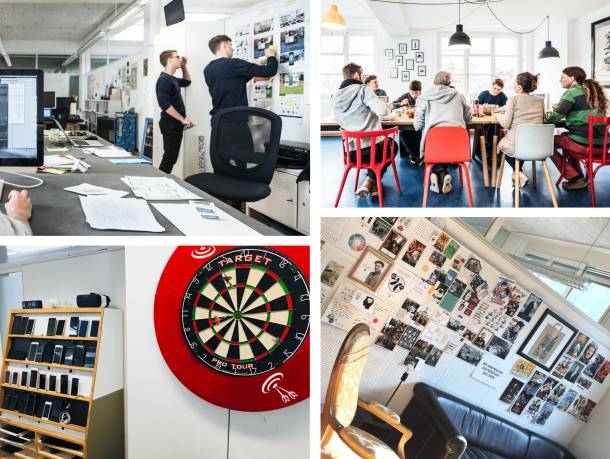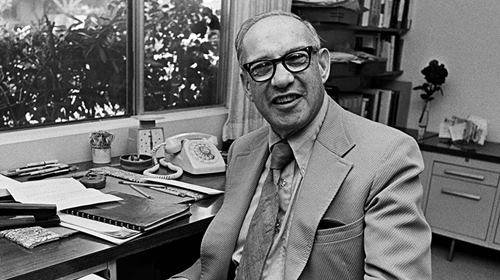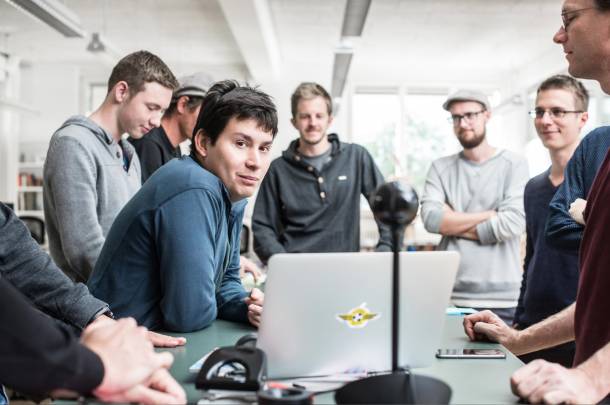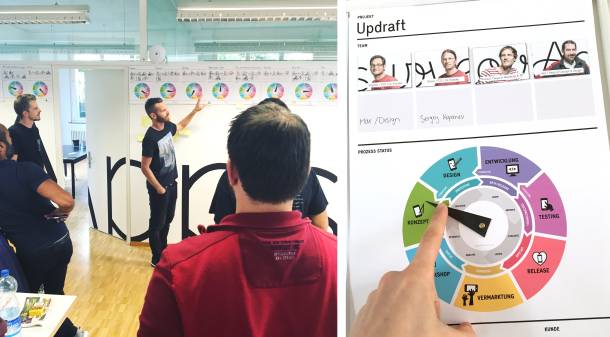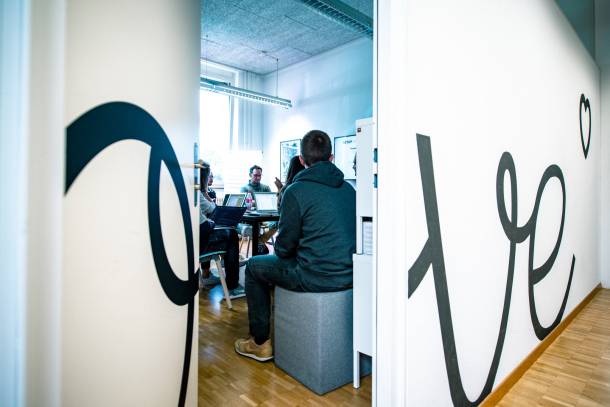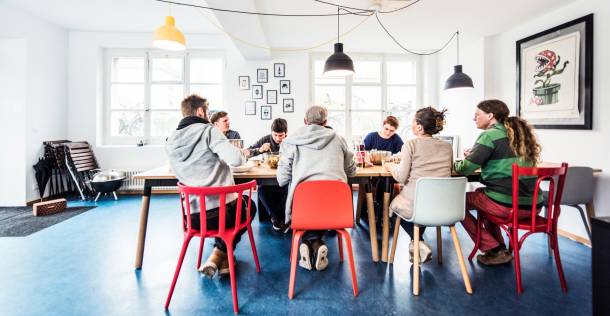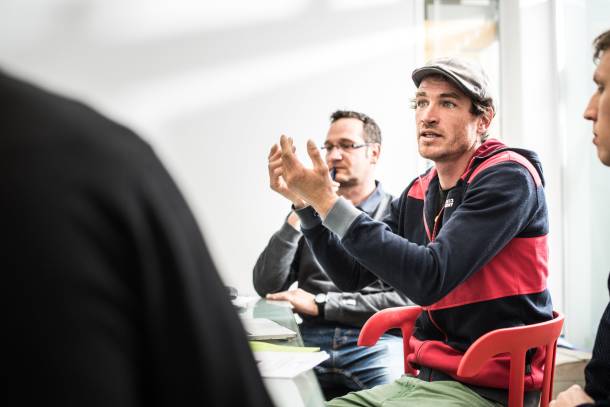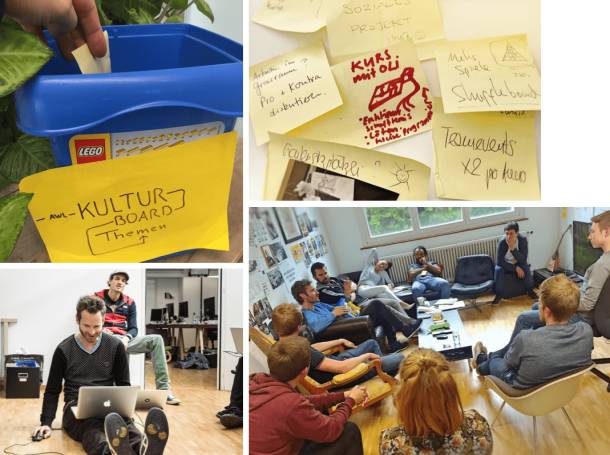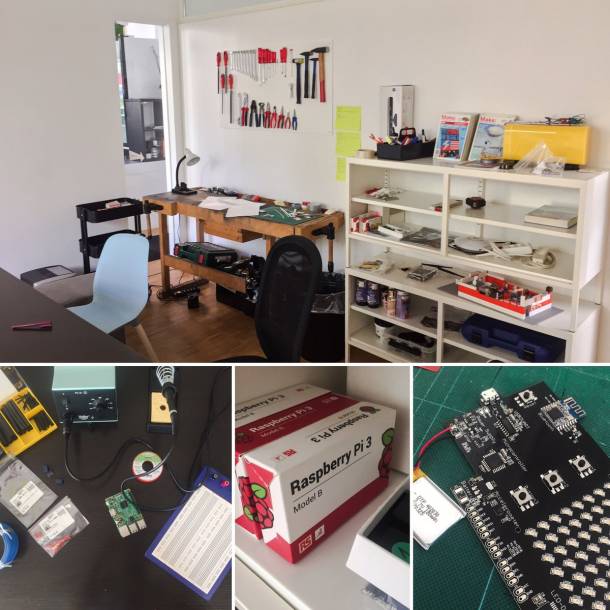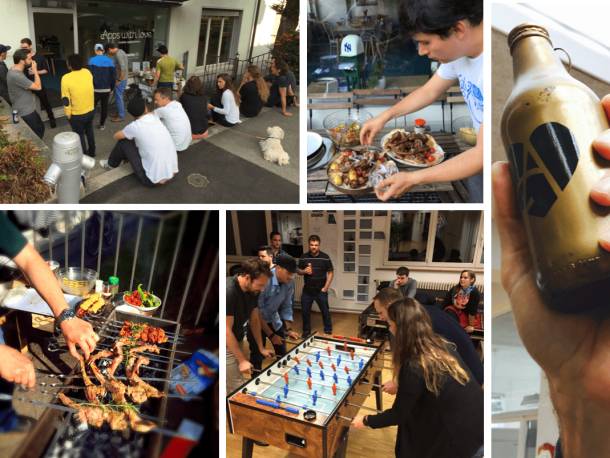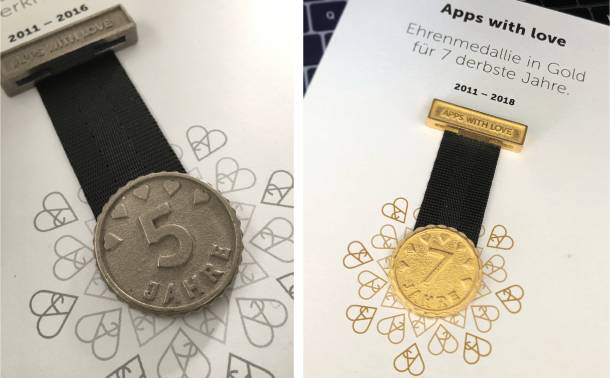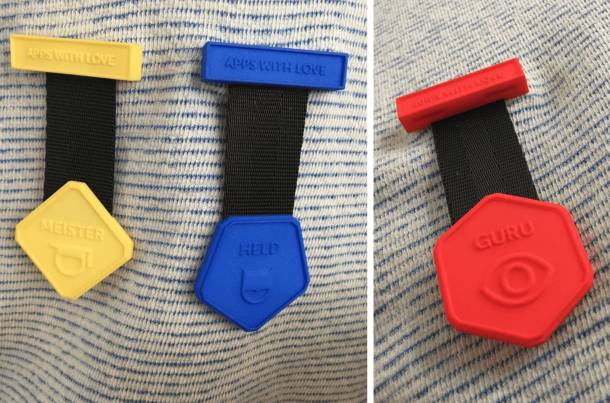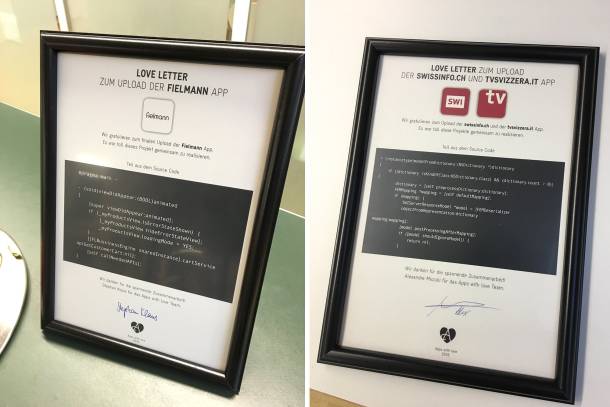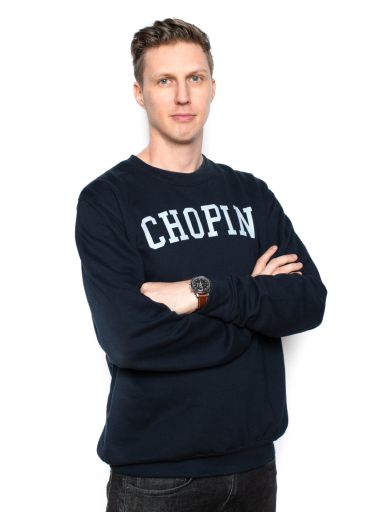Apps with love has introduced decision boards, flat hierarchies, and agile working methods with the aim of creating optimal conditions for agility and self-organisation and at the same time being able to act in a way that fits our culture. At Apps with love, we have thus developed in a direction in which we define our own rules and procedures, as well as design and optimise our own processes and structures. I'm going to give you some insights and examples of this here.
How do we define success?
Is it an impressive list of customers? Surpassing annual turnover? The awards you've won? Those are all of course signs of success, but success is not just measured by growth or full order books; success as we understand it can be seen in how strongly employees identify with the company and how much they enjoy spending their time there. It is often said that projects are what drive a company forward, but it is actually the culture employees experience in a company that makes it strong and fit for the future. Working at a successful or well-known company does not mean that your job makes you happy, not by a long shot. Studies have also shown the number one reason for quitting a job is not your salary, but the fact that the corporate culture conflicts with your own.
The life phase of a company
It is quite normal and important to go through different "life phases" as a company. Just like humans, companies start out full of energy and unrestrained motivation. However, this is also a critical phase that not every company can survive; they can be overconfident, misjudge themselves, or grow too fast. But if you do it right, you can use this energy and really get off to a flying start. Nothing can stop you now, can it? On the contrary, everyday working life and making the mistake of wanting to plan everything now can do so. You can quickly succumb to the temptation to introduce too much bureaucracy and too many structures that paralyse the entire company and make employees dissatisfied. Then begins the exploitation of human beings that inevitably ends in death. The company is now at a crucial point. It can either descend into aristocracy and bureaucracy or begin the process of self-discovery: you wonder why you founded the company, what drove you, what the fun of it was. This is where the renewal phase can begin, when you find the spark again, cast off the dead weight, and move the whole team towards a clear goal or vision. This renewal can restore passion and stability and set the company back on a safe path.
Corporate culture is sensitive
Even if things seem to be going well, you should always be working on yourself. A company is not a static entity. Ours reacts sensitively to various factors: time pressure, over-structuring, growth, or a disharmonious team can change the culture and weaken the company.
How do we stay healthy as a company?
Organic growth (only hire people you need long-term).
Only do what you do best. Let others do what they can do better.
Grow while staying small, with good partners who get involved on a project-by-project basis.
Carefully review project enquiries and make choices that foster your culture.
Allow and promote continuous further development.
Day - to - day business
Take a step back from everyday business to get new ideas and see the big picture.
Growth
Growth is not a healthy corporate goal. We only grow slowly and carefully. Nobody wants to lay off employees because of hasty growth.
Over - structuring
Certain structures are important and give a company stability; the difficulty lies in finding the right extent for the company.
Jobs
There is a phase where you have to accept every job, but at some point you should start selecting projects that fit the company and the strategy and vision you have chosen. Accepting too many projects paralyses the whole company and makes it difficult to deliver quality.
Wannabe
If the company pretends to be something it is not, people will soon notice. You don't have to worry about your public image if you are the way you want to be.
We have already fallen into all these traps ourselves in our nearly 7-year company history.
Be yourself and feel free
Many companies are more likely to set themselves up to impress customers rather than to provide employees with an inspiring work environment. Of course, your own office is always an opportunity to show what you can do and what aesthetic quality your brand represents. Nevertheless, I believe that it is first and foremost about offering employees space for their ideas and work processes. We deliberately have few corporate furnishings, so every employee can use the walls and rooms as they want. At first glance, this might look a bit chaotic, but it increases the feel-good factor considerably. But be careful: not everything that calls itself a start-up is run with love, as this article shows.
Culture is king
Culture eats strategy for breakfast
Peter Drucker
As the saying goes: the customer is king. Well, yes and no... Of course, customers are important and they should be cherished and looked after, but the culture at a company is even more important. Without a team that can stay on task while having fun and being motivated, your customers will not benefit from the best performance. If you want to implement successful projects, you should advise your customers honestly. Customers are not always right; they need and expect the expertise of the experts. So quality is king too!
The quality standards should not be defined by the customer, but by the company that manufactures the products for the customer. Ideally, your standards for yourself will far exceed customer expectations: perfection is achieved by paying attention to numerous small details that are hardly noticed individually. Those who strive for perfection should plan enough time for creativity at the beginning of a project and fine-tuning at the end. With app projects, often what reaches the store is an MVP (Minimal Viable Product). To make it a top app, however, more effort is still required after the initial release to improve the functionality, fine-tune the design, and enhance the user experience.
DIY Organisation
Of course, you can introduce existing organisational concepts such as Holacracy, but, like every human being, every company and its employees are different and it can be worth investing a little more time and developing an organisational structure tailored to your own situation.
The operating system of a company consists of:
The shared intentions, the culture that develops, and the rituals and structures that are introduced (organisational principle).
The roles of the people at the company and their competencies.
The infrastructure (work tools, machinery, and equipment).
If you want dedicated staff, you must not be afraid of transparent structures. When a team is given responsibility, it must also be able to make its own decisions.
Self - organising teams need:
A shared vision (goal/meaning/purpose)
Open culture on an equal footing (feel free, feel good)
Rules, rituals, and structures (how we do it)
Role models (they can do it, we can do it)
Simplicity (less is more)
How we do it
Here are our solutions at Apps with love, i.e. the rules, rituals, and structures by which we organise ourselves while also constantly questioning and renewing ourselves. An important goal of these measures was also to increase transparency within the company. Every employee should be familiar with the order situation, important events, and decisions.
Rituals, structures and boards at Apps with love
Rules:
All employees may participate and have a say
Participation is voluntary
Stand up
A daily standing meeting in which everyone present in turn briefly tells the others what they are working on today and if they face any obstacles. This means the whole team has an overview of who is present and what they are working on. This enables synergies to arise and small problems to be clarified. The stand-up meeting usually takes no longer than 10 minutes.
Analogue process overview
A seemingly simple improvement has helped us keep track of our projects, development phases, and project teams. For each project we have a physical project sheet with the project title, client, project team, and the current project phase. The project managers simply move the arrow to the phase the project is currently in, like on a clock. This means everyone in the company has an overview of all current projects and can see who is responsible for which area in the project.
By the way, this idea came out of one of our culture boards.
Info board
Every week, we get together for an info board where we discuss topics such as:
News & input from employees
News & input about Apps with love
Current external communication
Sales situation (project inquiries)
Drawing tickets for chores (waste paper disposal & general tidiness)
Determining the next board leader
Chore Tickets
Every week there are a lot of small chores we do ourselves to keep the office tidy and running smoothly. Since it was not easy to assign these tasks in the past, we started to draw tickets after our weekly meeting. This is by no means fair, but it provides much more fun and excitement than a simple task rota. In the meantime, we have developed our own tickets that oblige people to do the following chores: waste paper and glass disposal, leading the next team meeting, watering plants, tweeting from the company account, and maintaining the coffee machines. The tickets are written a bit tongue-in-cheek to present the task in a positive light. The draw is always an exciting event and the chores are no longer seen as so negative but as part of the game. The tasks and the drawing have become a set ritual that is accepted and implemented by everyone.
Eating together
At least once a week, we eat together at a table and natter about bots and the world. Every Tuesday, our chef cooks a fine meal that we look forward to all week long.
Sales board
Every week, we discuss new requests Apps with love has received at the sales board. This ensures that all employees always have an up-to-date overview of the requests and can actively play a part in accepting or rejecting them.
The following criteria help us to decide:
What is the current order situation like?
Do the order and customer fit our vision and culture?
Do we have time and the right resources?
Will we learn anything new?
Is the budget high enough to develop something really good?
Do the planned approach and methodology suit us?
How we make decisions:
Usually: through mutual agreement and short discussions
Occasionally: through clear decision-making criteria (coordination) or by those with expertise, e.g. project or sales managers
Culture board
In a central location, there is a pot where people can put any number of suggestions in the form of written notes. About every two months, or simply when the pot is full, a culture board is held again. Every suggestion and every concern is discussed without reservations and, if necessary, followed up by the next board - or, in the best-case scenario, resolved immediately.
The culture board only lasts one hour at a time, yet the results are remarkable. Employees have a place where they can bring up topics that are often neglected in everyday business or for which there is normally no time. This does not mean they aren't equally important. It can be liberating for work to write down a topic that is close to your heart with the assurance that it will be discussed at the culture board. This means you don't have it hanging over you all the time and can clear your head again.
For the culture board to work, the company and management team must be willing to take the issues and the resulting measures seriously and to implement them if necessary.
Rule: it is only for topics that have nothing to do with specific projects.
Read more about the culture board in this blog post.
ID board
About 3-4 times a year, we take a day to work on our own ideas and projects. You can tinker with your own chosen project or join in on another employee's idea. This produces completely new concepts and solutions that often have nothing to do with our core business, but still inspire us.
Thirsty Friday
On the first Friday of every month, we declare it Thirsty Friday. After work, we open our doors and fridges, everyone is welcome, and there is beer, barbecue, conversation, and games. The team often mixes with interested parties, friends, and clients.
Time to play
This ritual is triggered twice a week by a random generator. A melody sounds and reminds everyone to get up and play a game. Even if you have opportunities to play in the office, you are often mired in work and even if you feel like it, it is hard to motivate others. That's why we have automated it and it works quite well - we play a lot more often. Of course, our clients are also welcome to join in if they happen to be there. We explicitly encourage play during working hours, as it is good for the back, the eyes, and the mind to do something completely different for a moment. Regular contact with other employees also has many positive effects, of course.


Motivation cannot be bought in the long run, but what you can do is create conditions in which a positive corporate culture can arise and employees can develop.
Till Könneker / Co-Founder of Apps with love
Orders and medals of honour
An order system gives us the opportunity to playfully express our mutual recognition and to reward outstanding achievements. These orders are awarded for outstanding achievements on a project and for loyalty to the company. With the yearly medals that are awarded for the first time after 3 years, you get a wish free that will be fulfilled by the company. Such things play an important role, at least as shown yet again by studies. The effects of honorary titles were investigated at the IBM research centre in Zurich and at a call centre. The result: those who receive an award work better afterwards. Those who got nothing did not work any worse. But what matters to us about this ritual is the fun of it.
We also have some rituals in the project phase; I want to mention two of these here, because they improve our customers' experience with Apps with love.
Needfull Cards
We have developed a set of cards in which we have collated an extensive collection of the most important terms related to app development, in addition to nuggets of wisdom from the team. This helps our customers gradually become app experts and gain know-how. We have also put together a liste of technical terms on our website.
Love Letter
After the first time each app is uploaded to the app store, we give the customer a "Love Letter" with the app icon and a small excerpt from the source code. The Love Letters are signed by the project manager and come in a plain black frame.
Play & Error
There are lots of smaller programmes in the "operating system" that can keep our company fit and healthy and increase employee satisfaction. Every company is different and should adjust its organisational structures individually. It is important not to be afraid of test runs: you only know if something works or not once you've tried it. If it brings about an improvement, it can be a big gain; if not, you try something else.
We have gone so far as to tackle the sensitive issue of wages and developed our own fair wage model, which treats all employees equally and takes a load off our minds. Read more about it in this
blog post.
No matter how much effort you put into the organisation and corporate culture, there will be setbacks and things that don't work as intended. It's something you need to be constantly working on and questioning. But every setback can also be an important lesson for the future.

People are never satisfied, no matter how well they're doing. But dissatisfied people change the world.
Till Könneker / Co-Founder of Apps with love


